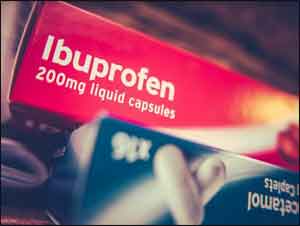- Home
- Editorial
- News
- Practice Guidelines
- Anesthesiology Guidelines
- Cancer Guidelines
- Cardiac Sciences Guidelines
- Critical Care Guidelines
- Dentistry Guidelines
- Dermatology Guidelines
- Diabetes and Endo Guidelines
- Diagnostics Guidelines
- ENT Guidelines
- Featured Practice Guidelines
- Gastroenterology Guidelines
- Geriatrics Guidelines
- Medicine Guidelines
- Nephrology Guidelines
- Neurosciences Guidelines
- Obs and Gynae Guidelines
- Ophthalmology Guidelines
- Orthopaedics Guidelines
- Paediatrics Guidelines
- Psychiatry Guidelines
- Pulmonology Guidelines
- Radiology Guidelines
- Surgery Guidelines
- Urology Guidelines
Shocking : 20 percent non-steroidal painkillers users exceed daily limit

Chances are you or someone you know has used nonsteroidal anti-inflammatory drugs (NSAIDs) within the last month. NSAIDs, such as Advil (ibuprofen), Aleve (naproxen) and Celebrex, are among the most commonly used medicines in the U.S. These drugs can have serious side effects, including GI bleeding and sometimes heart attacks, and are often taken without medical oversight because many are available over-the-counter.
Now, for the first time, researchers have found that 15 percent of adult ibuprofen users exceed the maximum recommended dose of ibuprofen or other NSAIDs in a one-week period. Exceeding the daily limit often followed taking too much of a single NSAID at one time, taking two different NSAIDs at the same time, or failing to wait long enough before taking another dose.
"It is important to understand how many users exceed the maximum, how they do it and what characteristics are associated with over-use. This knowledge can help guide consumer interventions to promote safer use," explained lead author David Kaufman, ScD, Director of Boston University's Slone Epidemiology Center and professor of epidemiology at Boston University School of Public Health. The study was a collaborative effort of Slone, Pinney Associates (Pittsburgh, PA), and Appleseed Consumer Insight (Arlington, MA), co-directed by Kaufman and Saul Shiffman, PhD, Senior Scientific Advisor to Pinney Associates.
Approximately 1,300 individuals who reported taking an ibuprofen medication in the preceding month completed a daily diary of their NSAID use for one week, and took ibuprofen during that time. The researchers then were able to compute their ingested daily dosage and compare it with the recommended daily maximum dose.
Those who exceed the recommended dosage tend to have a combination of medical factors such as chronic pain and poor physical state, attitudes conducive to ignoring the label recommendations, and poor knowledge of those recommendations. The authors suggest that attitudes and knowledge, along with specific dosing behavior and compliance with label directions, are potentially modifiable, which could lead to safer use of NSAIDs.

Disclaimer: This site is primarily intended for healthcare professionals. Any content/information on this website does not replace the advice of medical and/or health professionals and should not be construed as medical/diagnostic advice/endorsement or prescription. Use of this site is subject to our terms of use, privacy policy, advertisement policy. © 2020 Minerva Medical Treatment Pvt Ltd